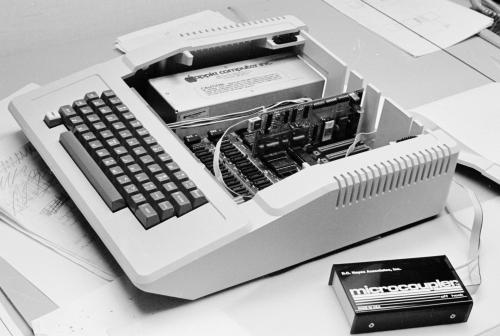Two books on the history of hacking
I recently finished reading two great books on the history of hacking:
The first one was ‘Hackers’ by Steven Levy:

‘Hackers’ is a history of hacking from the mid-1950s at MIT all the way to game programmers in the early 1980s. On the way we meet lots of folks at the MIT AI lab; a number of early IBM mainframes, an early transistorised computer (the TX-0), several iterations of DEC’s PDP machines, the first “personal computers” (including the Altair 8800 (based on the Intel 8080), the Apple I and Apple II and the Atari 800), the birth of Microsoft (I didn’t know MS started by writing a BASIC interpreter for the Altair 8800), and the birth of the games industry. The book was originally published in 1984 but has had two “afterwords” added: one in 1994 and one in 2010.
(Here’s the Altair 8800 and Apple II:)


The book is very easy to read and does a great job of telling the personal stories of many of the characters involved. (Don’t expect any juicy technical details though: that’s not what this book is for).
One striking thing I learnt from the book is that “agile, open-source development” is not a new thing. Far from it. It was the natural way of working for many programmers in the 50s, 60s and 70s. It was only when software became a financially lucrative industry that managers came along and tried to enforce unrealistic, over-managed software engineering methodologies (which still have their place, of course).
It was also striking that AI was at the heart of “hacking” in the 50s and 60s (courtesy of the MIT AI lab and, later, the Stanford AI lab (SAIL)). Several of the early hackers were fascinated with chess AI, “Life” etc. I had heard of “60s AI Optimism” but I hadn’t realised quite how influential AI was in driving early hacking endeavours.
I was also surprised that, according to the book, users of early personal computers like the Apple II had two languages to choose from: BASIC or assembly! I would have thought that C would have played a larger role.

The second book was “Free as in Freedom: Richard Stallman’s Crusade for Free Software” by Sam Williams. This was a really touching and lucid portrait of Richard Stallman (RMS), “the last true hacker”. (“Hackers” dedicated a chapter to RMS). This book gave me a lot of respect for RMS. I, like many others, hadn’t appreciated quite how important GNU was in the birth of GNU/Linux. RMS wrote the first versions of lots of tools I use on a regular basis including gcc, gdb and Emacs (Emacs started life at MIT AI lab).
Anyway, I highly recommend both of these books to anyone who’s interested in the history of programming. Both are good reads and also full of information.
I’ve just started reading “The theory that would not die” by Sharon Bertsch Mcgrayne about the history, successes and failures of Bayes’ rule. So far I’m really enjoying it.